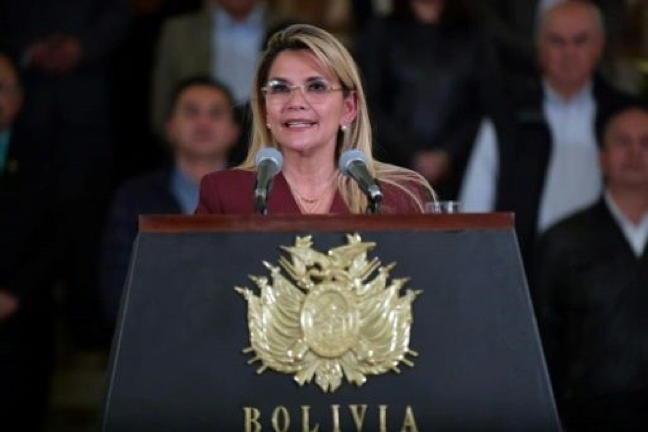
(above) Jeanine Anez assumed the presidency last November after her predecessor Evo Morales fled the country
Bolivia president signs off on September elections
despite virus fear June 21, 2020 - Original article: Agence-France Presse
Bolivia's interim president Jeanine Anez signed into law Sunday a bill calling for general elections on September 6 after criticism over her reluctance to hold a vote during the coronavirus pandemic.
The conservative leader assumed the presidency in November after her predecessor Evo Morales fled the country following three weeks of protests over his controversial re-election to an unconstitutional fourth term.
She had been under pressure to ratify a bill to set a new date for elections, originally scheduled for May 3 but postponed because of the public health emergency.
"I have received pressure demanding elections on September 6, that is, in the midst of the pandemic. I have a country suffering and many politicians and authorities demanding elections as soon as possible," she said in a recorded message.
Anez rejected accusations that she intends to remain in power and demanded that Morales, his chosen successor Luis Arce and fellow candidate Carlos Mesa "assume with courage the responsibility they have for demanding so insistently that we hold elections in the midst of a pandemic."
The three men have yet to respond.
Both chambers of Congress approved the bill setting September 6 as the new date last week, despite her party abstaining from the vote.
But Anez had resisted signing the bill into law, arguing it would coincide with the worst moment for the spread of the pandemic and would put the health of citizens at risk.
Health minister Eidy Roca told reporters Sunday that Bolivia would reach a peak of 130,000 infections by mid-September
The country recorded more than 1,000 daily cases for the first time on Saturday, bringing the total number of confirmed infections to 23,512.
Jeanine Anez assumed the presidency last November after her predecessor Evo Morales fled the country